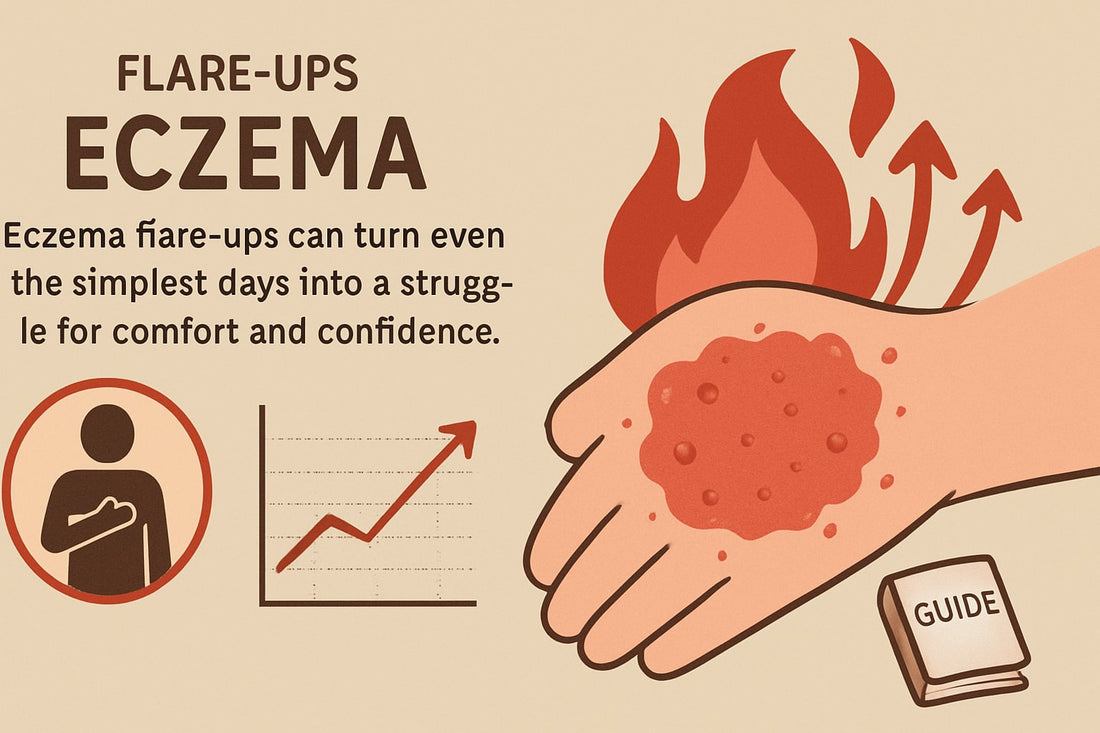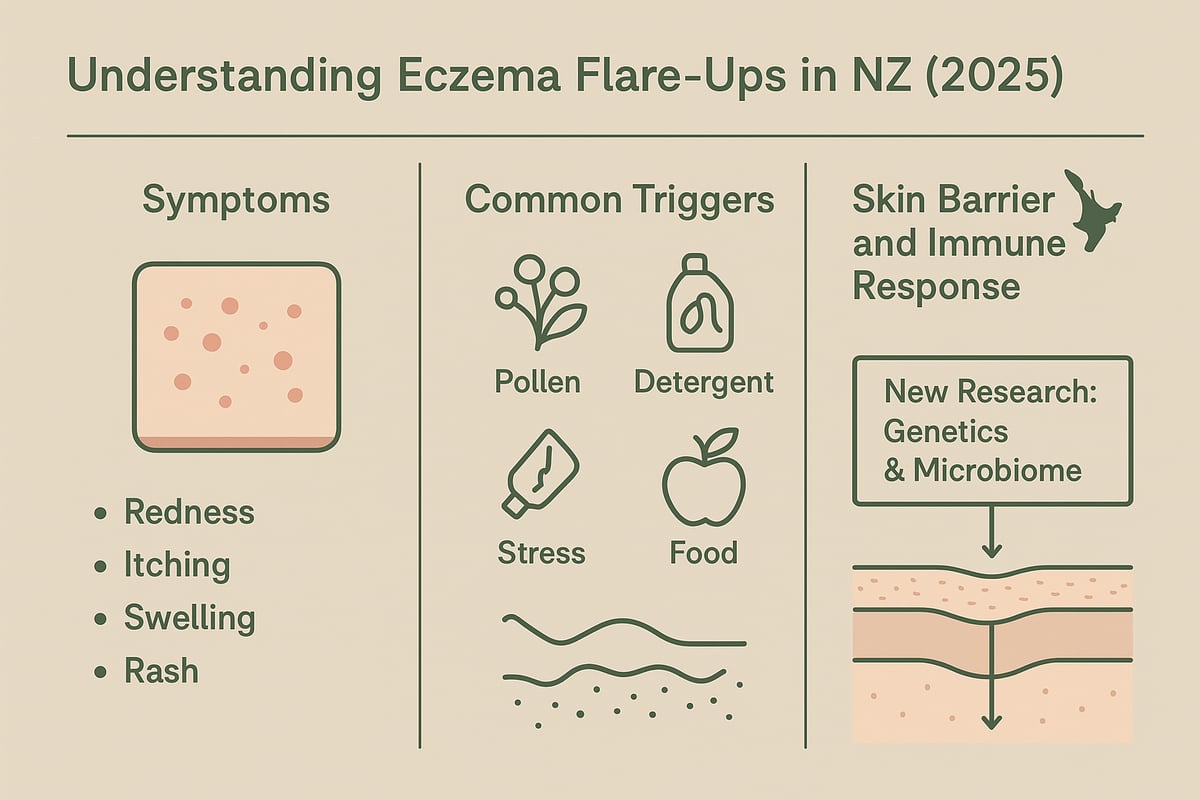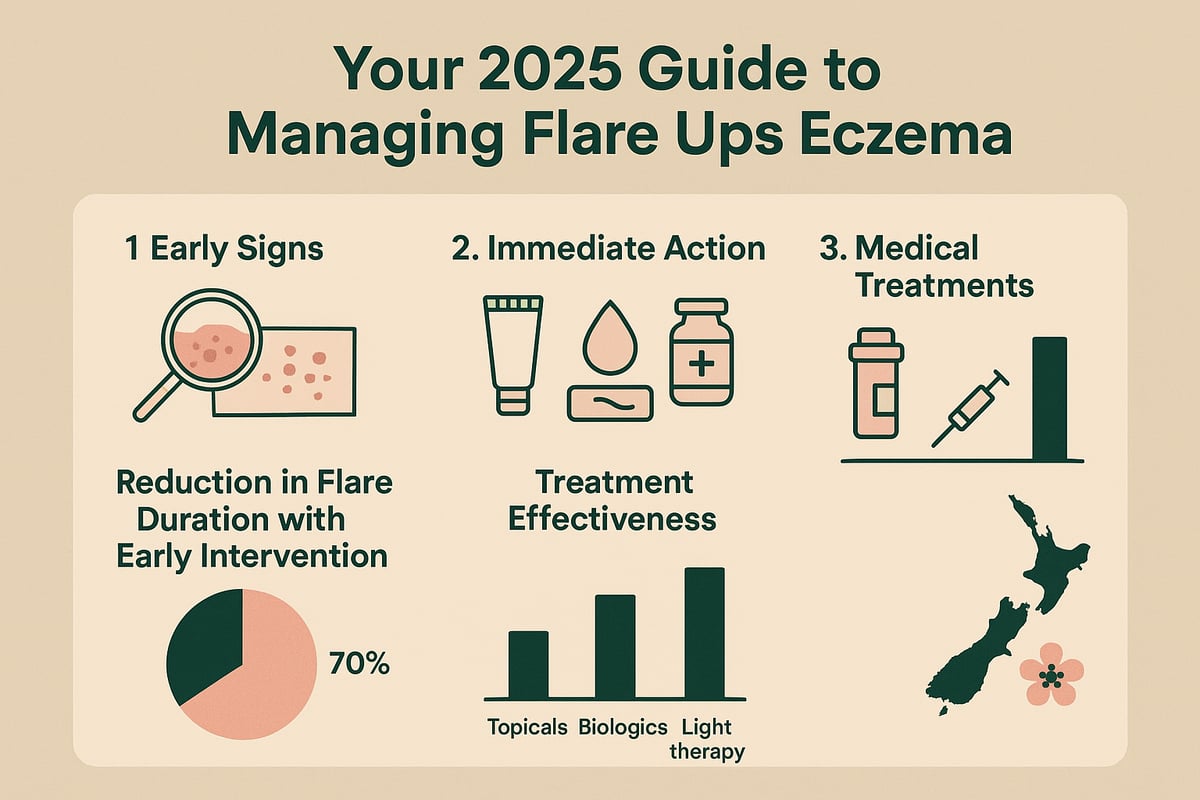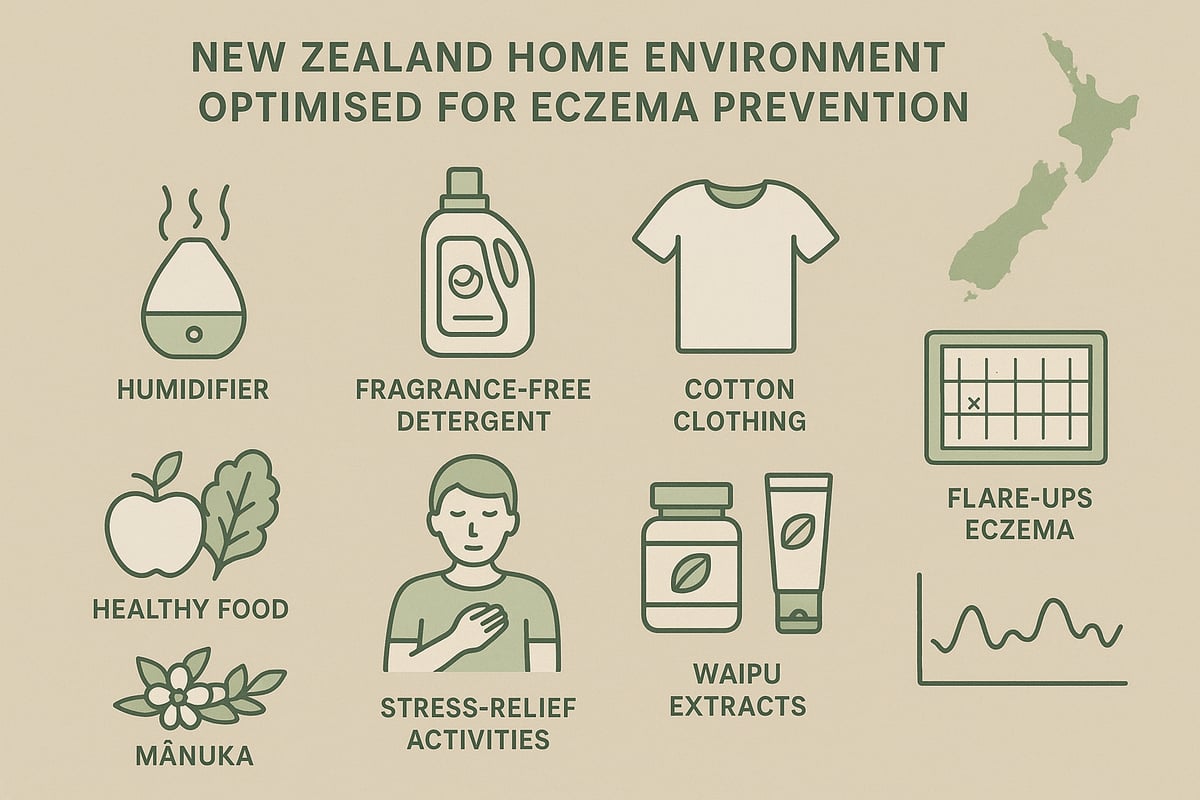
Flare Ups Eczema Guide: Expert Tips for Calm Skin 2025
Eczema flare-ups can turn even the simplest days into a struggle for comfort and confidence. If you’re searching for real answers and lasting relief from flare ups eczema, you’re not alone. In 2025, new research and expert insights bring hope to those living with sensitive, reactive skin.
This guide is designed to walk you through everything you need to know: what causes flare-ups, how to spot them early, and the most effective treatments—both medical and natural, including New Zealand’s own Mānuka solutions. Discover step-by-step routines, prevention strategies, and practical tips for long-term control. Ready to reclaim calm, healthy skin? Dive in for expert-backed solutions.
Understanding Eczema Flare-Ups: What, Why & How
Eczema can be relentless, especially when flare ups eczema strike out of the blue. Understanding what sets off these flare-ups, how they manifest, and the latest science behind them is the first step in reclaiming comfort and calm.

What Is an Eczema Flare-Up?
A flare ups eczema episode means a sudden spike in symptoms like redness, intense itching, swelling, and rash. These flare-ups can show up as inflamed patches, dry or cracked skin, and sometimes oozing or crusting. Many people notice the itching is worse at night, often disturbing sleep and quality of life.
Chronic flare ups eczema can linger for weeks, while episodic ones might resolve in days but still cause distress. For example, a restless night from itching is a common complaint. Studies reveal up to 1 in 3 adults with eczema experience regular flare-ups, leading to both physical discomfort and emotional fatigue.
Common Triggers for Flare-Ups
Pinpointing what triggers flare ups eczema is crucial, yet tricky. Environmental factors such as temperature swings, humidity changes, pollen, and pet dander can all play a role. Everyday irritants like soaps, detergents, perfumes, wool, and synthetic fabrics are frequent culprits.
Allergens, including certain foods (like dairy or nuts), and internal factors like stress, hormonal shifts, or infections, also spark flare ups eczema. For instance, many people notice symptoms worsen after using fragranced laundry detergent. In fact, 80% of sufferers identify at least one environmental trigger, according to Common triggers of eczema flare-ups. Triggers are highly individual, so tracking your own is vital.
| Trigger Type | Examples |
|---|---|
| Environmental | Pollen, dust, humidity |
| Irritants | Soaps, detergents |
| Allergens | Dairy, nuts, pet dander |
| Internal | Stress, hormones |
The Science Behind Eczema in 2025
Today, we know flare ups eczema begin with a weakened skin barrier. This barrier, usually protected by proteins like filaggrin and healthy skin lipids, can be compromised, making skin more vulnerable. The immune system then overreacts, sending out inflammatory signals that cause redness and itching.
Recent research highlights the role of genetics and the skin microbiome in flare ups eczema. For example, studies show that imbalances in skin bacteria can worsen symptoms. This evolving understanding paves the way for personalised treatments, including natural options like Manuka extracts, which support barrier repair and a healthy microbiome. The future of eczema care in New Zealand is increasingly tailored to each individual’s skin.
Step-by-Step: Managing Eczema Flare-Ups Effectively
Managing flare ups eczema can feel overwhelming, but a structured approach makes a real difference. Let’s break down each step so you can respond confidently and quickly, keeping symptoms under control and your skin on track for recovery.

Step 1: Recognise Early Signs
The first step to managing flare ups eczema is learning to spot trouble before it escalates. Early warning signs often include increased itchiness, a patch of redness, noticeable dryness, or mild swelling. These little hints can pop up after using a new product or with a sudden shift in weather.
Keeping a symptom diary is one of the most effective ways to track patterns. Write down when you notice symptoms, what you were exposed to, and any potential triggers. Over time, this can help you connect the dots and intervene sooner.
For example, if you notice a flare up after switching laundry detergent, jot it down. Early action can halve the duration of a flare, so acting fast pays off. Remember, the sooner you recognise the signals, the easier it is to keep flare ups eczema from spiralling out of control.
Step 2: Immediate Action During a Flare
When flare ups eczema hit, gentle care is your best defence. Start with a lukewarm bath or shower using a fragrance-free cleanser. Avoid hot water, which can dry and irritate the skin even more.
After bathing, apply a thick layer of emollient within three minutes to lock in moisture. Choose creams or ointments over lotions for better protection. If itching is intense, use a cold compress or try distraction techniques to keep from scratching, which can lead to infection.
For severe cases, wet wrap therapy can provide rapid relief. This involves applying moisturiser, then covering the area with damp, soft cloths, followed by a dry layer. This method soothes, hydrates, and protects vulnerable skin. Prompt, gentle care helps prevent complications and supports faster healing during flare ups eczema.
Step 3: Medical Treatments & Innovations for 2025
If home care is not enough, there are more options than ever for treating flare ups eczema. Medical treatments now range from tried-and-true topicals to cutting-edge biologics and advanced therapies. Here’s a quick comparison:
| Treatment Type | How It Works | Best For | Notes |
|---|---|---|---|
| Topical Steroids | Reduces inflammation | Mild-moderate flares | Short-term use only |
| Calcineurin Inhibitors | Suppresses immune response locally | Sensitive areas | Non-steroidal |
| PDE-4 Inhibitors | Blocks itch/inflammation | Mild-moderate flares | For face/body |
| Biologics (e.g. dupilumab, lebrikizumab) | Targets immune pathways | Moderate-severe cases | Injectable, long-term |
| JAK Inhibitors | Blocks itch/inflammation systemically | Severe or resistant | Oral/topical, rapid relief |
| Light Therapy (UVB) | Slows skin cell overgrowth | Resistant eczema | Doctor-supervised |
Combining prescription treatments with regular moisturising maximises results. Recent advances mean biologics can reduce moderate or severe flare frequency by up to 60 percent. Always consult your dermatologist to find the right mix for your needs and to stay updated on what’s new for flare ups eczema.
Natural Solutions and Complementary Therapies
Natural solutions are gaining attention as more people seek gentle ways to soothe flare ups eczema. While medical treatments are essential, many find that combining them with natural remedies brings added comfort and resilience to their skin. Let’s explore how evidence-backed botanicals and New Zealand’s Mānuka can play an important role in your eczema journey.
The Role of Natural Ingredients in Calming Skin
Nature offers a toolkit of gentle remedies to help manage flare ups eczema. Ingredients like colloidal oatmeal, coconut oil, sunflower oil, and shea butter have scientific backing for their anti-inflammatory and skin-soothing effects.
Many families use oatmeal baths to relieve itching, especially for children with flare ups eczema. Adding baking soda or a small amount of bleach to bathwater can also help with irritation or infection risk, but always check with your health provider first.
It’s important to remember that natural remedies work best as a complement to prescribed treatments, not a replacement. Used together, they can help calm the skin and restore a sense of comfort during flare ups eczema.
Mānuka Extracts: New Zealand’s Gift for Eczema Relief
Mānuka, native to New Zealand, is becoming a standout natural option for flare ups eczema. Its unique antibacterial and anti-inflammatory properties have been shown in studies to ease redness and support skin barrier repair.
Scientists have discovered that full-spectrum Mānuka extracts help reduce itching and improve skin resilience. Many people with flare ups eczema report rapid relief, especially for stubborn or chronic patches that haven’t responded to other natural options.
What sets Mānuka apart is its ability to support the skin’s microbiome and boost recovery. As research grows, personalised natural care is now more possible, offering fresh hope for those struggling with flare ups eczema.
Waipu Extracts: Harnessing the Power of Full Spectrum Mānuka for Eczema
Waipu Extracts, based in New Zealand, delivers a world-first full-spectrum Mānuka extract designed for flare ups eczema. By preserving the entire range of active plant compounds, these products offer maximum healing potential for sensitive skin.

The range includes Pure Mānuka Extract, Hyper Blend, Boost Blend, and Skin Rescue Balm, all free from synthetic additives and safe for all ages. Customers often share stories of rapid improvement, especially when other solutions haven’t worked, including during topical steroid withdrawal.
Made with a focus on purity and clinical results, Waipu Extracts brings together tradition and science. For many, this natural, NZ-made approach is transforming how flare ups eczema are managed, providing a gentle yet potent path to relief.
Prevention Strategies: Keeping Flares at Bay
Preventing flare ups eczema is about more than just reacting quickly. By building an eczema-safe environment, fine-tuning your daily routines, and addressing lifestyle factors, you can greatly reduce flare frequency and severity. Let’s explore the most effective strategies for keeping your skin calm and resilient.

Building an Eczema-Safe Environment
Your home environment plays a key role in managing flare ups eczema. Small changes can make a big difference:
- Use humidifiers to keep air moist, especially during winter.
- Avoid overheating rooms, which can dry out skin.
- Dust regularly and choose hypoallergenic bedding.
- Switch to fragrance-free, gentle laundry detergents, and double rinse clothes and bedding.
- Choose soft, breathable fabrics like cotton or bamboo. Avoid wool and synthetics that may irritate your skin.
- For pet owners, regular grooming and limiting close contact during flares can help.
- Consider switching to hypoallergenic bedding to further protect sensitive skin.
Studies show that 70% of people see fewer flare ups eczema after making these environmental adjustments. For more tips, you can explore Preventing eczema flare-ups at home for expert guidance.
Daily Skincare Routines for Sensitive Skin
Consistency is the secret weapon in preventing flare ups eczema. Establish a gentle, protective routine:
- Cleanse skin once daily with lukewarm water and a fragrance-free cleanser.
- Moisturise immediately after bathing, before bed, and whenever your skin feels dry.
- Use thick emollients and barrier creams, especially on hands.
- Protect skin during chores by wearing cotton gloves.
- Keep nails short and practice stress-relief techniques to avoid scratching.
Applying emollient straight after a shower locks in moisture, giving your skin the best chance to stay calm. Waipu Extracts’ full-spectrum Mānuka solutions, like our Skin Rescue Balm, add a natural, science-backed layer of defence for sensitive skin.
Diet, Stress, and Lifestyle Factors
Lifestyle choices can be powerful allies in the fight against flare ups eczema. Pay attention to:
- Common food triggers such as dairy, gluten, eggs, or nuts. Work with an allergist to pinpoint your own sensitivities.
- Stay well-hydrated to support overall skin health.
- Practice stress management techniques like mindfulness, meditation, or yoga.
- Maintain good sleep hygiene with a regular routine and a cool, comfortable bedroom.
Many people report fewer flare ups eczema after making small dietary changes and focusing on stress relief. Even a simple yoga routine or removing a food trigger can make a noticeable difference.
Monitoring and Tracking Progress
Ongoing tracking helps you spot patterns and fine-tune your prevention plan:
- Use a digital diary or symptom tracking app.
- Schedule regular check-ins with your dermatologist or GP.
- Adjust your routines based on seasonal or lifestyle changes.
By staying proactive, you’ll be able to catch triggers early and enjoy longer periods of relief.
When to Seek Medical Help and Advanced Care Options
Knowing when to reach out for extra support can make all the difference in managing flare ups eczema. Sometimes, even the best home routines are not enough. Let’s break down when to call in the experts, how dermatologists create tailored plans, and what’s on the horizon for new treatments in 2025.
Recognising When Home Care Isn’t Enough
Sometimes, flare ups eczema cross a line, and self-care is no longer enough. Watch for warning signs like yellow crust, pus, fever, or red streaks—these all suggest possible infection. Severe flares that do not settle with your usual routine, or that disrupt sleep and daily life, are red flags.
If you notice persistent itch, worsening pain, or your skin is not healing, it’s time to seek medical help. In fact, Eczema prevalence and impact statistics show that 1 in 5 people with eczema need professional intervention every year. Early action can prevent complications and help you get back on track.
Working with Your Dermatologist: Personalised Plans
Your dermatologist is your partner in tackling stubborn flare ups eczema. They will assess your symptoms, review your routines, and may suggest allergy testing to uncover hidden triggers. Patch testing can help reveal sensitivities to common products or fabrics.
Customising your treatment plan is key. Dermatologists can prescribe advanced medications, recommend new topical therapies, or suggest biologics for severe cases. Their guidance ensures you are using safe and effective options, reducing the risk of side effects or long-term damage. With expert help, you can regain control and confidence.
Exploring Clinical Trials and New Treatments in 2025
If standard treatments are not enough, consider exploring clinical trials for flare ups eczema. Exciting new therapies—like AhR agonists or microbiome-based creams—are now being studied in New Zealand and globally. Ask your dermatologist about upcoming studies and eligibility.
Participating in a clinical trial offers access to cutting-edge solutions and helps advance research for everyone living with eczema. Staying informed about new options means you can be among the first to benefit from innovative therapies, bringing fresh hope to your eczema journey.
Living Well with Eczema: Practical Tips for Everyday Life
Navigating daily life with flare ups eczema can be challenging, but small changes can make a big difference. Whether you are at work, school, or out with friends, practical routines and thoughtful planning help keep skin calm and confidence high.
Managing Eczema at Work, School, and Social Events
Balancing flare ups eczema with a busy lifestyle is all about preparation. Keep a small moisturiser or balm in your bag for quick touch-ups during the day. Choose loose, breathable clothing and avoid wool or synthetics, which can trigger itching.
Let colleagues or teachers know about your needs. Simple conversations can lead to support, like fragrance-free classrooms or access to gentle hand sanitisers. Planning ahead, such as packing skin-safe wipes or gloves for cleaning, means you can handle unexpected triggers with ease.
By staying organised and proactive, you can minimise the impact of flare ups eczema and focus on what truly matters—enjoying each moment with confidence.
Supporting Children and Teens with Eczema
Children and teens facing flare ups eczema need extra care and understanding. Establish gentle, age-appropriate routines using mild cleansers and child-safe emollients. Encourage kids not to scratch by offering distraction tools, like fidget toys or soft mittens at night.
Work with teachers to create medical action plans and ensure access to soothing products at school. Wet wrap therapy can provide comfort during severe episodes. Remember, every child’s triggers are unique—tracking symptoms helps tailor support.
Understanding the interplay of genetic and environmental factors in eczema can empower families to make informed choices and advocate for their child’s wellbeing.
Mental Health and Emotional Resilience
Living with flare ups eczema can affect self-esteem and emotional health. It’s normal to feel frustrated or anxious, especially during persistent flares. Support groups, both online and in-person, offer a safe space to share experiences and tips.
Mindfulness, relaxation exercises, and therapy can help manage stress, which is known to trigger flare ups eczema. Encourage open conversations about feelings—sometimes, just being heard makes a world of difference.
Prioritising mental wellness is just as vital as physical care. With the right support, you can build resilience and live well alongside eczema.
If you’re feeling overwhelmed by the ups and downs of eczema, you’re definitely not alone. We’ve explored how understanding your triggers, building gentle routines, and tapping into nature’s most powerful ingredients can help you find calm, healthy skin—even when flare-ups strike. If you’re ready to take the next step and want a natural solution that’s trusted by so many others, it could be time to discover the soothing power of full spectrum Mānuka. You deserve relief that works. Explore the potential for yourself here:
Get Your Mānuka Extract Today

